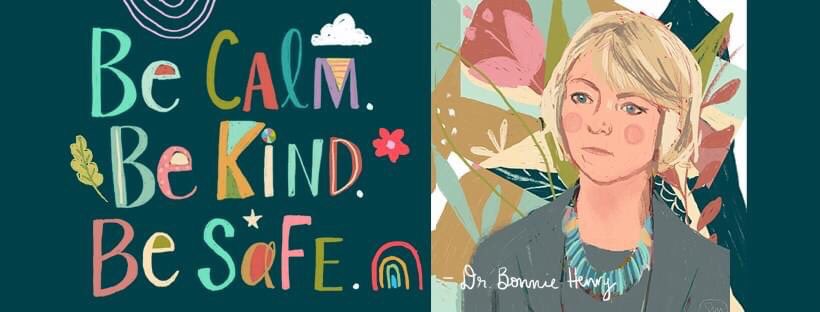Kindness First and Foremost

I have been giving some extra thoughts these days to Lesson 17 from the Skills Manual. As I reflected in my last blog, British Columbia has a provincial health officer whose motto is “Be kind, be calm, be safe.” Everyone in my province has been reminded of this daily though COVID updates, but also through all the merchandise the motto has produced to support local charities! I myself own a fetching charcoal grey tee. (It is the top of my wardrobe choice for my next in person training). Anyway, enough about post COVID fashion fantasies, let’s return to kindness.
In Lesson 17 we include worksheet 17.B which asks class members to check off what acts of kindness they had practiced. Some examples include:
Kindness first and foremost means treating other people as we would like to be treated.
Kindness first and foremost is willing to suffer pain or make self-sacrifices for another person, without always expecting something in return.
Kindness first and foremost is able to stand up against powerful others, with humility, in order to prevent unwarranted harm or unethical behaviour.
Kindness first and foremost is willing to let another person win (and never tell them), simply because it matters more to them than it does to you.
I have been teaching classes for a long time now, and I thought I had really mastered the last bullet point above about “winning.” I have been given some feedback that my competitiveness gets in the way of relationships (cue Flexible Mind Adopts!), and not just recently! Recall that when we speak about the bio social model, one of the key messages that OC folks receive either implicitly or explicitly from their environment is that winning is essential. This messaging can result in the coping habit of compulsive striving. If you have to be Number 1 at everything…everything is critically important. And if you lean to OC, you know first hand that compulsive striving results in being pretty exhausted. I recall getting red in the face angry losing games with my family of origin (I mean, what 10 year old wouldn’t know all the answers in Trivia Pursuit – the Boomer edition to boot!), throwing my bicycle over a fence as a teen when a partner out paced me, I forfeited sleep on an international flight so I could get a perfect score on the in-flight trivia game, and Scrabble was banned early in my marriage. I would like to think I have mellowed overtime (smugly winning at not winning) but my mother-in-law, who I play backgammon with several times a week, might disagree.
Yet, as I grow in my personal practice of radical openness, my understanding of the concept of “winning” has changed. It is not just winning at games and other competitive aspects of life (I am embarrassed to say I would sometimes apply for academic jobs just because I wanted to be the chosen candidate) that needed my attention. It was relational winning as well. This became abundantly clear about a year and a half ago. My partner had come home from a coffee date with her friend. The friend had given her a copy of There’s a Hole in the Sidewalk, by Portia Nelson (read it here: https://www.goodreads.com/quotes/95085-i-walk-down-the-street-there-is-a-deep-hole.) If you are a therapist in North America, you have probably given this poem out yourself, used it in former groups, or like me, had a laminated copy on your office wall. My partner was raving about the poem, saying things like: “I think some of your clients would love this!” and “what a brilliant analogy!” In that tiny moment, I noticed the urge to reply: “everybody knows that poem.” Huh. How many times had I done something similar? How many versions of winning showed up in my conversations with her (and others?) How many times had I declined help, shut down conversations, been an ass at meetings because I already “knew better.” Ouch. You better believe that some self enquiry emerged from this one! I recognized that one of my fears of letting others win was that I would become a doormat. Or, if that other people let me win, it would be out of pity and not kindness.
So, what did I do in that poem moment? I kissed her beautiful face and said thank you in a genuine manner, following up with “I am sure my clients will love it.” In that moment, I just didn’t have to win and it felt awesome. It was not until writing this blog that I was reminded of a moment where something similar was offered to me. In graduate school, I excitedly went to a meeting as a research assistant and told the primary investigator: “I found this amazing writer, his name is Foucault [I pronounced it foe-calt].” Dr. Hoskins just smiled her warm smile and said, “that looks like it will be very helpful.” She did not say, everyone in academia knows that theorist.
For both the poem and Foucault examples, I cringe a bit. The first for being such a bossy boots, the second for ever thinking the gift of kindness meant I was being pitied. Thank goodness the handout also reminds us that “kindness first and foremost means being kind to oneself by blocking automatic self-blame or self-hatred while retaining an ability to question oneself in order to learn from what the world has to offer.” This may be, ahem, a work in progress.
And finally, for those of you who are wondering how I can let my partner win and not have her know given this blog is public, well, do me a favour and let’s keep it under our hats! She’s really into Mary Oliver’s poetry right now, so hopefully she remains distracted!
Art by local Victoria, BC artist Sharon Montgomery. sharonmontgomery.net